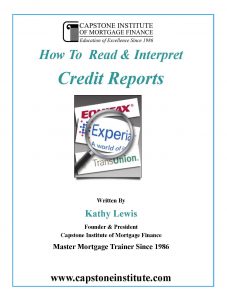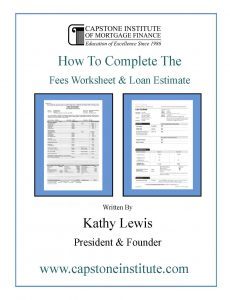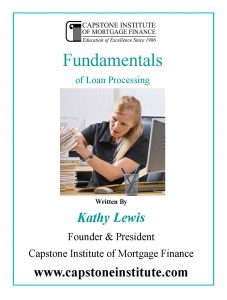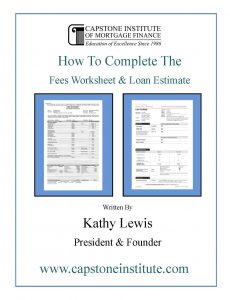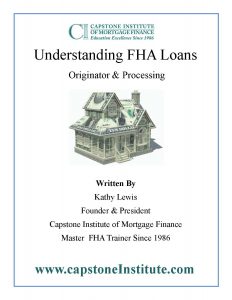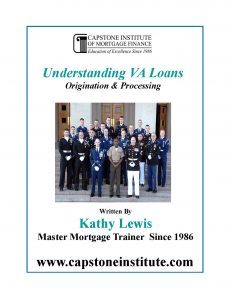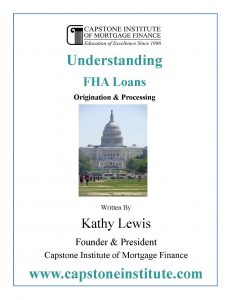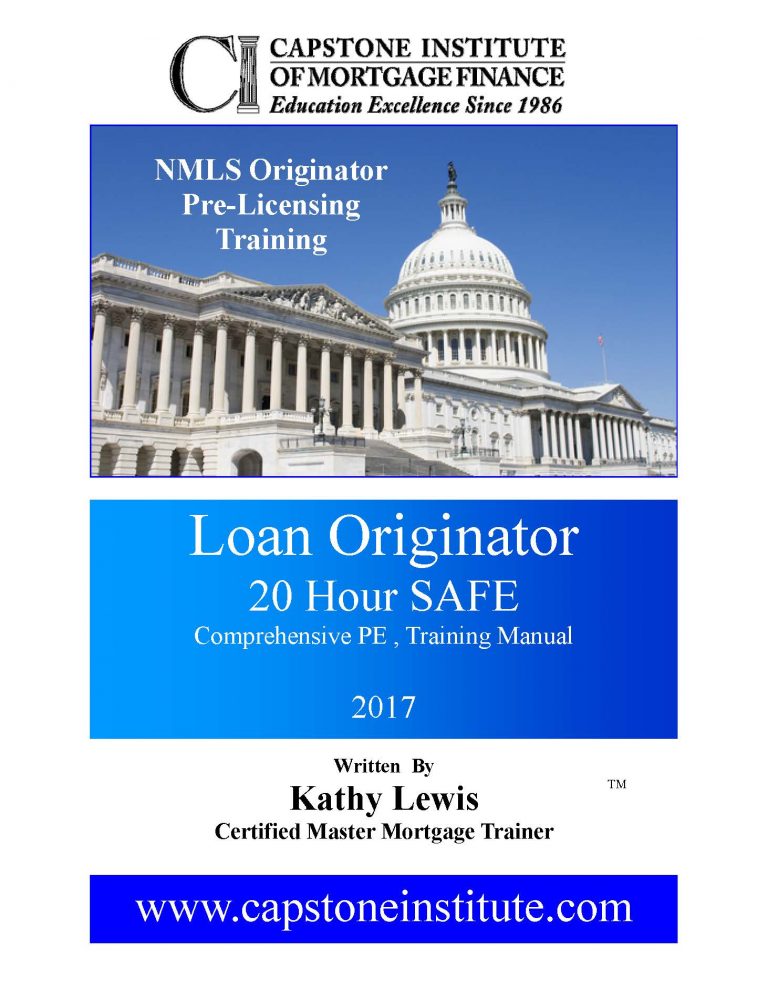Description
Certified Mortgage Graduate
Loan Processing
Tuition is:
$795.00
$795.00Add to cart
Attention: Trainers and Branch managers
Enhance your current processing training with our CMS program. Let us introduce your new staff into
all the processing skills they’ll need to master.
Corporate trainers and branch manager can now be more effective in their training curriculums because
their new processors will already understand about LTV’s, Ratio’s, Federal Regs, RESPA, TILA, Verification,
Disclosures, Fees Worksheet, RESPA, TILA and Loan Estimate.
Client companies using our CMS programs report they now can invest more time in fine-tuning processor skills and procedures versus having to review all the basics skills first.
The best benefit has been the ease of training their new processors on their origination software.
Their new processors are no longer intimidated by the numbers and box options because they already have
an understanding of how the loan application works and the associated forms and disclosures that are required.
About The Training
Instructor: Kathy Lewis
Duration: 40 Hours / 6 months access
Included: Printed Manuals and Case Studies And Online Manuals And Case Studies
Loan Processor CMS Curriculum: 40 Hrs. Approximate Training Cycle
1st: How To Read Credit Reports
2nd: Correctly Calculating The Borrowers Income
3rd: Fundamentals Of Loan Processing (Conventional Loans)
4th: Fees Worksheet & Loan Estimate
5th: Understanding FHA Loans
6th Understanding VA Loans
1st Lesson:
How To Read & Understand Credit Report
Credit reports are divided into five sections:
* Whose credit is being represented
* How they pay their bills
* Rollovers
* Public records
* Inquiries
When reading and interpreting someone’s credit report, it’s important that you have the knowledge and skills to do so. This training is going to give you the knowledge and the skills
Loan Originators & Processors
After taking a correct mortgage loan application (1003), the first thing the loan originator and/or processor need to do is to compare it against the person’s credit report. Checking names, residences, opened accounts, tradelines, credit limits, available credit, closed accounts, collections, charge-offs and other information vital to the outcome of the loan’s approval or denial. Sometimes there are errors in a report.
The challenge is to read it carefully every time and understand how to interpret the information correctly.
Reading a credit report for the first time is very intimidating. Lots of pages with data, tables, codes, contact information, addresses, payoffs …the list goes on.
Your instructor Kathy Lewis is going to take all the mystery and confusion away. After completing this course, you’ll have the knowledge and confidence needed to read any credit report accurately.
Lesson # 2:
Correctly Calculating The Borrower’s Income/ With Online testing
Kathy Lewis’s presentation is easy to follow and is synchronized to your
manual and case studies. When Kathy asks you to move to section 5- page 25
in your manual; your PC screen will match your page in your manual.
Believe it or not:
One of the top reasons loans are returned or denied by lenders is the improper
calculation of the borrower’s income.
Regardless of who’s mortgage software you’re using, your software can’t look
at the borrower’s income documentation and apply underwriting rules on what’s acceptable and what’s not.
Only competent originators and processors can review the borrower’s income and decide if it’s acceptable or not.
Overview of what’s covered:
-
20% Declining Income Rules: When you need to use them.
-
The allowable differences in combining w-2’s -1099’s- and expenses
-
When and how to average different incomes over the past years and months
-
When and how to average commissions
-
When and how to deduct business expenses (New Updates are included)
Lesson #3
Fundamentals of Loan Processing (Conventional) With Online Testing
Capstone Institute trained processors are better organized because they are taught a systematic way of problem-solving and how they’re going to address any problems which could arise in the future which could stop their loan from closing on time.
Capstone processors don’t have to rely on computer software to perform their jobs. Every processor who receives their certificate understands how to calculate every number and formula within a mortgage application, with only a basic financial calculator.
Our structured training prepares processors to perform their duties and responsibilities, quickly and with minimal management supervision.
Our training covers every job skill a new processor needs to understand. As a new conventional loan processor, your duties, skills and technical knowledge are held to a higher standard than a loan originator.
Why? Because it will be your responsibility to ensure that every statement of fact that the borrower has made on their mortgage application correctly reflects the borrower’s true identity, employment history, verifiable income, and all their assets and liabilities. As part of this training, you’ll be processing full loan files from start to finish.
Additionally, you’ll need to ensure your loan originators always stay in compliance with all state and federal lending laws, rules and guidelines or your loan will never be approved.
Lesson 4:
How To Complete The Fees WorkSheet & Loan Estimate
Fees Worksheet & Loan Estimate manual Master
Processors need to intimately understand the workings and all the calculations involved with their Fees Worksheet & Loan Estimate.
We strongly advise that all new processors complete this training prior to them being introduced to any loan origination software.
Understanding how the calculations and bundling of fees work; enhances new processors initial learning time and teaches them how to find and make corrections as well as answering questions from loan originator and their borrowers.
Lesson # 5
Understanding FHA Loans / With Online Testing

There’s no such thing in the real world as FHA 101 or beginner FHA or basic or advanced FHA. You either know the FHA rules, guidelines, policies and procedures or you don’t.
Capstone Institute and Kathy Lewis have been instructing FHA loan originators and processors since 1986. We don’t teach theory or divide FHA loans into modules like FHA Part 1 and FHA Part 2 to charge higher tuitions.
Nor do we cut our training time and content into separate training for originators and another for processors because we believe everyone needs to understand the complete process from origination to closing.
No shortcuts with our training. Your online video program is synchronized to your FHA manual, handouts, case studies and covers everything you or your department needs to master to properly counsel your borrowers and to close your FHA loans on time.
View some of our honored clients:
US Department of HUD:
Philadelphia Homeownership Center
Atlanta Homeownership Center
Denver Homeownership Center
Santa Anna Home Ownership Center
National & Regional Lenders
Freedom Mortgage
Union Pacific
FlagStar
Renasant Bank
Bank of America
Chase
Citibank
Wells Fargo
Regions Bank
Fifth Third Bancorp
Sun Trust
RESMAC
Lesson #6:
Understanding VA Loans / With Online Testing
VA Programs & Guidelines
Determining the Veteran’s Eligibility
VA Allowable & Non-Allowable Fees – How to Complete the Fees Worksheet
Qualifying the Borrower & Determining Residual Income
Preparing All VA Forms
VA Purchase
VA Refinance
VA Streamlines Guidelines

